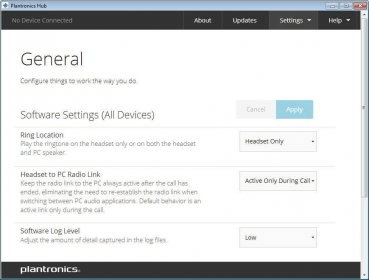
When using Zoom for macOS the headset call control button may not work reliably for the first call. When using some softphones, ignoring a call while a Calisto 5300 is muted can result in the loss of mute synchronization between the speakerphone and Windows/Hub Resolves an issue causing excessively large DeviceManager log files when using Hub 3.18 and Cisco Jabber 12.5.1 Resolves an issue preventing Thai and Indonesian from appearing in the Language drop down for BW8225 headsets
#Plantronics hub installer msi serial number#
Resolves an issue causing an incorrect headset serial number to be displayed when connected to a D200 dongle

#Plantronics hub installer msi update#
Implemented Acoustic Event reporting support for Savi 8210 and Savi 8220 products (firmware update required) European Journal of Cancer 2020 135:8-10.PLANTRONICS HUB RELEASE NOTES ARTICLE ID: Comment on “The experience on coronavirus disease 2019 and cancer from an oncology hub institution in Milan, Lombardy Region” and reflections from the Italian Association of Oncology Nurses.

The oncology nurses underlined that ensuring continuum of care is the key to success in COVID-19 and cancer management, as well as the strong need of keeping the connection between health needs and cancer management.īiagioli V, Belloni S, Albanesi B, et al. On the other hand, self-care strategies such as a well balanced diet, regular exercise and good relationships seem to be underestimated for their potential to support the immune response. In order to reduce the likelihood of being infected, about one third of study participants reported taking supplements which are not recommended by health professionals due to the lack of evidence from ongoing clinical trials. However, only 54% believed to be at higher risk for COVID-19 infection and 51% for complications. Patients with cancer usually feel more vulnerable than the general population and are more used to hypervigilance and protective measures, so it is not surprising that they adopted COVID-19 preventive behaviours promptly. Therefore, the oncology nurses highlighted that health professionals should help patients in prioritising their own health needs. Moreover, 44% of study participants reported the fear that their cancer diagnosis would be regarded as of secondary importance in time of COVID-19 pandemic. Increased perception of hospitals as places where people get infected could have added further uncertainty to patients whose illness anxiety has already been negatively influencing their mental wellbeing. Many patients experienced difficult access to safe cancer care (62%), especially regarding follow-up visits, which were often postponed.įurthermore, patients with cancer were afraid to go to the hospital even when they needed and even decided to cancel their appointments. Almost one third of patients (29%) reported that their cancer was not under control. The Italian oncology nurses commented that the patients with cancer not only were considered at higher risk for COVID-19 infection, but they also had to suffer from reduced cancer care activities. In terms of changes in relations with family members, 31.9% reported no kisses and hugs, 12% practising social distance, 6.8% using separate rooms and other measures were reported in 6.8% of cases. The reasons for leaving the home were mainly related to health or going to supermarket, while in only 8.3% for job reasons. The majority of patients were from the north of Italy (38.9%), followed by those from the south (34.7%) and from central Italian regions (26.4%).įindings of investigated survey topics indicate that 21.1% of study participants did not leave the home at all during the study period, while 59.3% only rarely.


The majority of patients had haematological malignancies (51.3%), followed by patients with breast cancer (26.2%) and other solid tumours (22.6%). The respondents were mainly women (75.9%), with a mean age of 50.3 years (range 25-78) and a high level of education (66,34%). They reported data from 195 patients who completed the survey. In a letter to the editor published in the August 2020 issue of the European Journal of Cancer, a group of oncology nurses communicated an interim analysis of survey data collected between 29 March and by the Italian Association of Oncology Nurses, as an effort to map the situation of the self-isolated patients with cancer at home in the context of the COVID-19 pandemic.


 0 kommentar(er)
0 kommentar(er)
